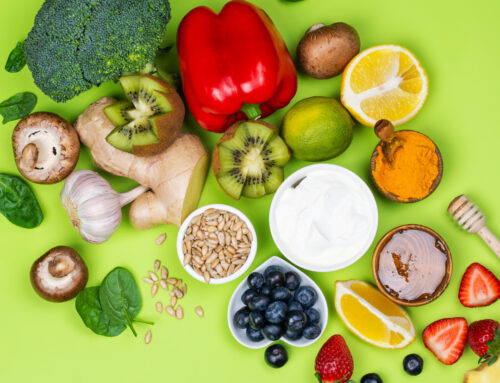May was Mental Health Awareness Month. Undoubtedly, mental health struggles and mood disorders have touched your life or that of someone you know. Life can be challenging. There are features of our modern world that undermine our ability to be resilient and adapt to change. But, here’s the good news: there is so much we can do to support our mental health through dietary and lifestyle interventions. With the proper tools, knowledge, and resources, we have more agency than perhaps we realize. Our psychology is linked to our physiology, and what we feed our bodies (literally and metaphorically) directly impacts how we experience and respond to the world.
In the book Nutrient Power: Heal Your Biochemistry And Heal Your Brain, author William J. Walsh PhD. says the following about the power of nutrients: an under-appreciated fact is that the primary raw materials for the synthesis of many neurotransmitters are nutrients, amino acids, vitamins, minerals and other natural biochemicals that we obtain from food.
Dr. Walsh points out that serotonin, the chemical messenger (neurotransmitter) that helps brain and nervous system cells communicate and is associated with feelings of happiness and well-being, is produced from the amino acid tryptophan, a protein constituent, and requires vitamin B6 to process. As another example, zinc and B6 are required to synthesize and regulate GABA (gamma-aminobutyric acid), a neurotransmitter that helps quell anxiety. There are many other examples of the role nutrients play in neurotransmitter synthesis.
It’s great to know we can help our brain function properly by bringing in the complex vitamins and minerals through a healthy diet. Yet, so many people do not get those nutrients in their bodies, making them more vulnerable to depression, anxiety, attention disorders, and other conditions. In fact, the high incidences of
mental illness in the United States is believed to be linked to poor nutrition and could be addressed through nutrition therapy.
No matter the issue affecting the brain and nervous system, we can support ourselves through nutrition in the following ways:
1)
Feed your microbiome. The gut is our second brain, and our microbiome is key to overall health. To heal the brain, heal the gut by increasing probiotic bacteria. For example, a recent study showed that eating yogurt can result in measurable changes in brain activity. This compelling study suggests that consuming probiotics can reduce anxiety and stress and may also reduce pain by modulating activity in areas of the brain that regulate those feelings.
If you are looking for some support around gut healing, functional nutritionist Lauren Sugarman at Inner Healing Wisdom is a great resource for you.Before refrigeration, our ancestors relied on fermentation to preserve food and ensure survival for long periods. Fermentation makes food more bio-available and introduces helpful bacteria to our gut, protecting the intestinal wall from dangerous invaders. Unfortunately, the lack of fermented foods in our diet, an over-use of antibiotics, and other features of modern life have done a number on our gut health. A decisive step you can take to heal the gut is to eat fermented foods regularly, such as saurkraut, kimchi, tempeh, and yogurt. Sandor Katz is a leader in the fermentation revival movement. Check out any of his books for practical guidance and thought-provoking insights regarding the relationship between humans and our bacterial allies.
2)
Get your omega-3s. There’s debate over whether you can get enough omega-3s that your brain needs through plant sources. We certainly can get some omega-3s, particularly the ALAs (alpha-linolenic acid) from our greens, our flax, our chia, our hemp, our walnuts, and their oils, but the best sources of DHA (do-co-so-hex-an-oic acid) are from fish and algae. A great source is
Nordic Naturals.
3) Consider Omega-3 and Omega-6 balance. Omega-6 is ubiquitous in processed foods because they have a longer shelf life than Omega-3s. For that reason, the modern American diet is way off balance when it comes to the proper Omega-3 and Omega-6 balance. So if you’re eating or have eaten a lot of omega-6s in your lifetime, you likely need to lay off and go for the omega-3s; that is, all except GLA (Gamma Linolenic Acid), a top chain omega 6 needed by your brain. Evening primrose oil or borage oil are excellent sources of GLA.
4) Balance blood sugar for your brain. The high blood sugars set off an inflammatory cascade that can negatively influence brain function.
5) Banish trans fats. Trans fats are chemically-processed fats that make the brain hard, rigid and slow.
6) Eat antioxidant-rich foods. Get lots of different colors in your diet from whole food plant sources to fight free-radical damage and deliver more oxygen to the brain through good blood flow.
7) Make sure to get those Minerals. Minerals are essential for brain health, particularly magnesium, zinc, chromium, selenium, potassium, and iron. Before you run out and get supplementation, consider what foods you can eat that provide those minerals.
8) Spice it up. Always spice it up. Several spices have been shown to decrease inflammation and preserve the brain’s fatty acid integrity. Great herbs include garlic, ginger, onion, oregano, rosemary, thyme, turmeric, and ginkgo (improve blood flow to the brain).
9) Get these mitochondrial nutrients in your diet that support the brain at the cellular level. These include: Vitamin E, CoQ10, Vitamin C, Zinc, magnesium, selenium, and alpha-Lipoic acid.
10) Of prime importance is your B-vitamins — your methyl donors. These also keep those homocysteine levels in check. I’d say that the B vitamins are not just in the top 10, but the #1 nutrient to add for brain health.
In addition, there are many things we can do in terms of lifestyle to support our brain health. We want to exercise, sleep, love, learn, laugh, and play to keep the brain happy and to fire just as we want it to be. Keep stress in check. It destroys those brain cells. We also want to be seeking out ways to reduce our toxic overload. Toxins kill brain cells.





